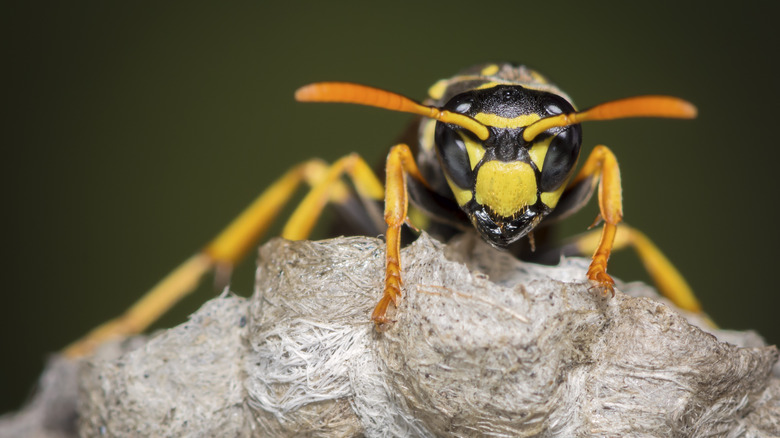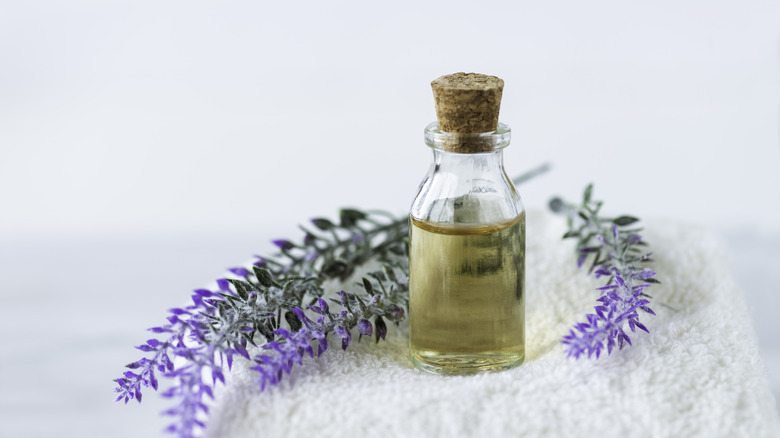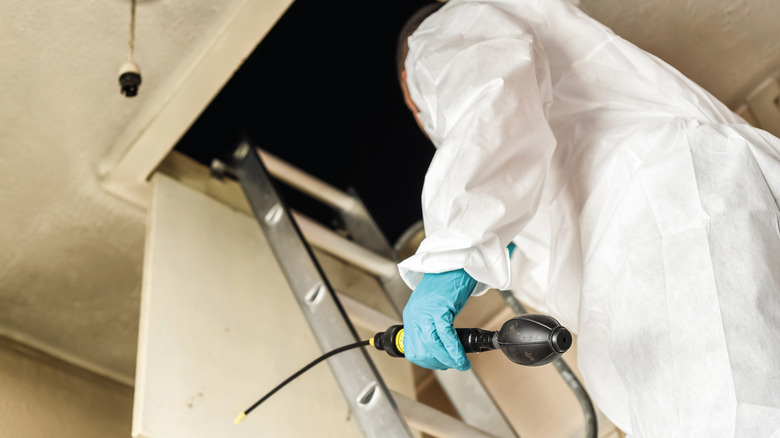Can Lavender Essential Oil Really Repel Wasps? Our Entomology Expert Weighs In.
While wasps aren't a welcome sight to most folks, many are searching for all-natural wasp repellants to replace the harsher chemical treatments. Especially because, along with bees, there's a global shortage of pollinators, a group to which wasps belong. We've heard tales of many essential oils used for DIY insect repellants, and one suggestion for warding off wasps was lavender oil. Curious about whether something as simple as a floral essential oil truly works, we reached out to our expert entomologist at Mosquito Squad, Emma Grace Crumbley, to get her take in an exclusive with House Digest.
The verdict? Lavender essential oil can be a good wasp repellent, but only to a certain degree. "As unlikely as it seems, there is research indicating that lavender essential oil may function as a spatial repellent to wasps," says Crumbley. She adds, "However, I would be wary of relying on essential oils when it comes to stinging insects like wasps." That's because the lavender oil may work as a temporary shield that drives wasps away from direct contact with yourself and objects doused in oil, but it can't actually control the population like professional pesticides and insecticides would, especially against the nest. "No matter how much lavender oil you apply to yourself and your clothing, stepping on a yellow jacket nest will still result in a myriad of stings and sores," Crumbley concludes. While you can still use lavender oil to effectively repulse wasps, it's important to understand its benefits and its limitations.
The perks of using lavender
While lavender oil won't help much when it comes to long-term wasp control around the home, there are still plenty of reasons to use it as part of your pest-fighting arsenal. In an exclusive with House Digest, Crumbley stated, "When applied correctly, essential oils and natural pest solutions are still effective forms of control, are less damaging and persistent in the environment, and pose little toxicity risk to people, pets, and plants." So if you're nervous about heading out and having a chance encounter with the business end of a wasp, applying a bit of lavender oil to yourself and any little ones might decrease the chance of a wasp hovering too closely. You can also apply it to certain objects you want wasps to steer clear of, like door handles or playground equipment.
But you may find yourself having to reapply oil frequently, unlike the sporadic spritz of DEET or RAID. Crumbley explains, "Essential oils also break down faster than chemically derived treatments. This means that applying lavender around your yard, the eaves of your home, or nearby trees may work to discourage insect pests for a short period of time, but frequent reapplications will be necessary to effectively treat your home (especially after a heavy rain event)." If you're relying on lavender oil to do the majority of the work to keep wasps at bay, prepare to reapply it often.
Is it better than commercial insecticides?
Crumbley, who also works with Mosquito Squad, a pest control service, remarks in her interview with House Digest that she's not opposed to essential oils being used as a component of pest control but that some species are better suited to it than others. She states, "For mosquitoes or other nuisance pests that pose less immediate harm, I think exploring natural remedies with a licensed pest professional is completely fine." But given the danger of wasps and their signature painful stings, Crumbley advises skipping the au natural system. "Instead use a professional service or an approved over-the-counter product to target and rid your yard of wasps."
This is especially true if you need to eliminate wasp nests and colonies, rather than just temporarily repel them. Even if you do decide to go the natural way to repel wasps and other insects, Crumbley recommends collaborating with professionals still, saying, "At the end of the day, opting for a natural treatment plan is not a bad thing. I would strongly suggest finding a professional pest control company, like Mosquito Squad, with technicians trained to properly apply natural solutions around your home for the best results." The final takeaway? Lavender oil is fine enough as a topical repellent for short bursts, but won't be enough to do away with wasps entirely.


